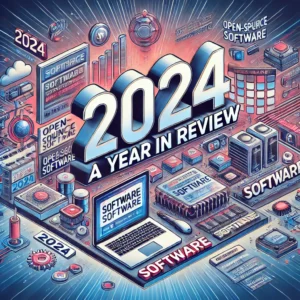 First of all, the entire Bootlin team wishes everyone a Happy New Year and best wishes for 2025!
First of all, the entire Bootlin team wishes everyone a Happy New Year and best wishes for 2025!
The end of a year and the beginning of the next one is often the right time to look back at what has been achieved, and think about what’s coming next. And we’re going to do exactly this in this blog post, summing up 2024 at Bootlin, a year that has been very active.
Team growth
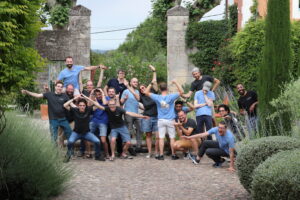 By the end of 2024, our team has reached a total of 25 people, with 24 with an engineering background and 1 administrative assistant. In 2024, a total of 7 people joined our team: Bastien Curutchet joined our Toulouse team in January, Richard Genoud joined our remote team in April, Mathieu Dubois-Briand, Olivier Benjamin and Antonin Godard joined our Lyon team in September, and finally Thomas Bonnefille and Miguel Gazquez joined our team in Toulouse in October and December respectively.
By the end of 2024, our team has reached a total of 25 people, with 24 with an engineering background and 1 administrative assistant. In 2024, a total of 7 people joined our team: Bastien Curutchet joined our Toulouse team in January, Richard Genoud joined our remote team in April, Mathieu Dubois-Briand, Olivier Benjamin and Antonin Godard joined our Lyon team in September, and finally Thomas Bonnefille and Miguel Gazquez joined our team in Toulouse in October and December respectively.
We’re very happy with this extended team, bringing a lot more expertise for our projects and training courses!
Office growth
In 2024, we relocated both our offices near Toulouse, France and near Lyon, France, doubling the capacity of each office.
In Toulouse, this has not only allowed us to have more space for ourselves, but also to host our hardware design partner Ratiotech in the same offices, thanks to which we are more tightly collaborating on hardware/software projects. See our previous announcement on this partnership.
Engineering projects
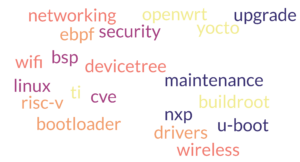 With close to 3000 days of engineering time delivered on our customer projects, it is impossible to summarize all the topics covered during this year, but here is an overview of some of the highlights:
With close to 3000 days of engineering time delivered on our customer projects, it is impossible to summarize all the topics covered during this year, but here is an overview of some of the highlights:
- We continued acting as the main contributor and maintainer of the official Yocto Project documentation, an effort that was transferred internally during the year to Antonin Godard
- We also continued acting as a strong contributor to the Yocto build engineering effort, as part of the Yocto SWAT team, an effort that was transferred internally during the year to Mathieu Dubois-Briand
- We took over the maintenance of a complex Linux BSP for several healthcare products based on NXP i.MX6 and Texas Instruments AM335x, with a focus on security and CVE maintenance, but also an upgrade of the Linux kernel and Yocto distributions
- Thanks to the sponsoring from Texas Instruments, we improved our fully open-source and vendor-neutral recovery and flashing project Snagboot to include a new tool called Snagfactory that allows to perform efficient factory-flashing of multiple devices in parallel, with a convenient monitoring interface. See our blog post
- We worked on several Linux BSP upgrade projects, for existing products in the field. Just to name two: we updated a complex Texas Instruments OMAP L138 platform to the latest upstream U-Boot and latest upstream Linux (this involved complex audio acquisition chains, DSP, and more), and we also updated an NXP i.MX6 platform to a recent upstream Linux kernel and recent Buildroot. This allows our customers to benefit from security updates, new features, and a saner code base with a reduced technical debt facilitating future updates
- We extended our work on STM32 MPU processors from supporting Buildroot to also supporting OpenWrt, and we extended the support to cover the new STM32MP2 processor series
- We continued to update, improve and maintain the meta-sifive Yocto layer, supporting RISC-V platforms from SiFive
- We started to work on various improvements to the eBPF Linux kernel infrastructure, sponsored by the eBPF Foundation. A small part of this effort has already landed in upstream Linux, and more will come in 2025
- We did a dedicated effort to improve the Microchip WILC wireless driver in upstream Linux, reducing the gap with the vendor-provided driver. We expect to push Bluetooth support for this chip to upstream Linux in 2025.
- We continued to work on improving the support of Mobileye MIPS processors in the Linux kernel, merging several drivers and Device Tree, an effort that will continue in 2025.
- Our previous work on power management on Texas Instruments Jacinto automotive processors got extended to be progressively integrated in upstream TF-A, U-Boot, Linux and TI’s DM firmware, an effort that has made good progress and is still on-going
- We worked on two separate projects involving Device Tree overlay support in Linux, which we are pushing in the upstream Linux kernel. One project to support a complex PCIe device that is described by a Device Tree overlay, which has been merged upstream, and a project where an expansion connector allows to plug/unplug at run-time an expansion board that uses non-discoverable busses, and for which the review process with the Linux kernel community is still on-going
- The DENT Foundation sponsored us to work on Power over Ethernet support in the upstream Linux kernel. Initial support, with two Poe controller drivers has been merged, and we are working on more advanced features that we expect to merge in 2025.
- We worked quite extensively on display testing, by improving the VKMS DRM Linux kernel driver, and extending IGT GPU Tools to support the Google Chamelium v3 display testing device. This effort will continue in 2025.
- We implemented a complete Linux Board Support Package for a new NXP i.MX93 platform, using a Yocto-based distribution, with strong security features: complete secure boot and encryption of all system components
Again, this is just a highlight of our projects, and we worked on many more Linux kernel driver development topics, Linux Board Support Package development, upgrade and maintenance, as well as investigating, debugging and solving numerous issues for our customers.
Training courses
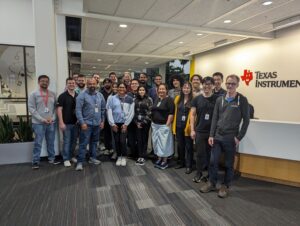 We delivered a total of 81 training courses in 2024, which is an all-time record for Bootlin. Out of these courses, 26 were conducted on-site at our customer location (a noticeable increase compared to 2023), while the remaining 55 courses were delivered on-line. In total, we trained 1081 engineers in 2024. Our team of engineers delivering training courses grew from 11 engineers in 2023 to 15 engineers in 2024, giving us more capacity to deliver training courses.
We delivered a total of 81 training courses in 2024, which is an all-time record for Bootlin. Out of these courses, 26 were conducted on-site at our customer location (a noticeable increase compared to 2023), while the remaining 55 courses were delivered on-line. In total, we trained 1081 engineers in 2024. Our team of engineers delivering training courses grew from 11 engineers in 2023 to 15 engineers in 2024, giving us more capacity to deliver training courses.
Over the course of 2024, we made 535 commits to our freely available training materials, with some notable improvements:
- Linux kernel driver development and Yocto system development courses ported to the TI BeaglePlay platform, thanks to the sponsoring from Texas Instruments, see our annoucement
- Debugging, tracing, profiling and performance analysis training course augmented with a whole new chapter and lab on eBPF. See our blog post on these improvements
- Yocto system development course updated to use the Yocto Scarthgap release, and the Buildroot training course updated to Buildroot 2024.02
We have plans for new training courses in 2025, so stay tuned, and contact us if you’re interested in seeing us cover new topics.
Open-source contributions
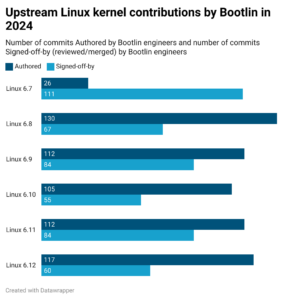 Bootlin is not just using open-source software to deliver services to its customers: Bootlin is a very active contributor to several key open-source projects in the field of Embedded Linux.
Bootlin is not just using open-source software to deliver services to its customers: Bootlin is a very active contributor to several key open-source projects in the field of Embedded Linux.
On the Linux kernel side: 6 Linux kernel releases were published in 2024, each with contributions from Bootlin: Linux 6.7, Linux 6.8, Linux 6.9, Linux 6.10, Linux 6.11, Linux 6.12, with a total of 629 commits contributed by Bootlin engineers. In addition to that, as several Bootlin engineers are Linux kernel maintainers, we reviewed/merged 461 patches from other contributors.
We started contributing more actively to Zephyr with several new drivers developed and contributed by Bootlin in 2024: a driver for the ST LSM9DS1 sensor, a driver for the ST7789V display controller and a driver for the Nintendo Nunchuk joystick. We also published a series of blog posts: part 1, part 2 and part 3 and this series will continue in 2025.
On the U-Boot side, we contributed 13 patches in 2024, and we have more already in the review process.
On the OP-TEE side, we contributed 22 patches in 2024, mostly related to supporting the Microchip SAMA5 processor family.
On the Yocto side, we contributed 103 patches to yocto-docs, 32 patches to openembedded-core, 9 patches to meta-openembedded, 24 patches to bitbake and 11 patches to yocto-autobuilder2. Beyond those direct contributions, as maintainers of the documentation, we reviewed/merged 50 patches in yocto-docs from other contributors, and as contributors to the SWAT effort, we reviewed/integrated 852 patches from other contributors in openembedded-core. See also our blog post about the Yocto Scarthgap release.
On the Buildroot side, we contributed 208 patches in 2024, but more importantly, as one of the Bootlin engineers is a co-maintainer, we reviewed and merged 2419 patches from other contributors.
Conferences
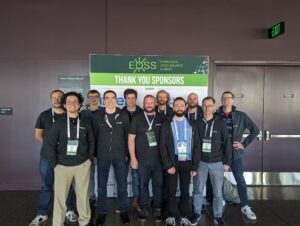 Bootlin is also well-known for being a strong participant to the key conferences in our space. Participating to such conferences is very important for us, for several reasons: it allows to keep our engineering team up-to-date with the latest developments in our field, it allows to connect with other developers and maintainers of key open-source projects, it allows to share our knowledge and experience by giving presentations, and more.
Bootlin is also well-known for being a strong participant to the key conferences in our space. Participating to such conferences is very important for us, for several reasons: it allows to keep our engineering team up-to-date with the latest developments in our field, it allows to connect with other developers and maintainers of key open-source projects, it allows to share our knowledge and experience by giving presentations, and more.
In 2024, we participated/contributed to:
- FOSDEM, with several Bootlin engineers attending, and for which Bootlin engineer Luca Ceresoli contributed as a member of the Embedded Devroom review committee, a duty that Luca continued with in 2025
- Buildroot Developers Meeting in in Brussels, February and in Vienna, September, which we co-organized and to which we participated
- Embedded Open Source Summit in Seattle, US, to which 11 Bootlin engineers participated, and in which 4 talks. See our blog post Our talks at Embedded Open Source Summit and our selection of talks part 1, part 2, part 3. Bootlin CEO Thomas Petazzoni was a member of the Embedded Linux conference review committee as part of this event.
- Linux Display Next Hackfest, to which Bootlin engineer Louis Chauvet participated, and shared some feedback in a blog post
- Open Source Summit Europe and Linux Plumbers to which 12 and 8 Bootlin engineers participated, respectively. We also gave 2 talks at Open Source Summit Europe, and 3 talks at Linux Plumbers. See our blog posts: Bootlin talks at Open Source Summit Europe 2024: slides and videos, Bootlin contributions to Linux Plumbers conference: slides and videos. Bootlin CEO Thomas Petazzoni was a member of the Embedded Linux conference review committee as part of this event.
- Kernel Recipes, which 4 Bootlin engineers attended.
- Capitole du Libre, at which we gave 3 talks, see our blog post
Elixir
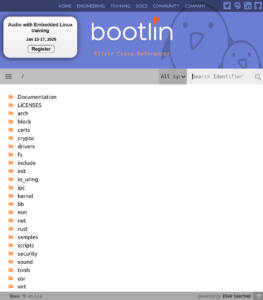 Last but not least, we dedicated a lot more time to improving our popular Elixir.bootlin.com source code navigation tool. The most important changes are not directly visible: we did many performance and reliability improvements, including migrating Elixir.bootlin.com to a much faster dedicated server. On the more user-visible features: the references are now displayed in a popup rather than in a new page, it’s possible to create links to a range of lines, the side-bar can be hidden, a button is available to download the raw source code, auto-complete of identifiers has been re-enabled, and more.
Last but not least, we dedicated a lot more time to improving our popular Elixir.bootlin.com source code navigation tool. The most important changes are not directly visible: we did many performance and reliability improvements, including migrating Elixir.bootlin.com to a much faster dedicated server. On the more user-visible features: the references are now displayed in a popup rather than in a new page, it’s possible to create links to a range of lines, the side-bar can be hidden, a button is available to download the raw source code, auto-complete of identifiers has been re-enabled, and more.
All these improvements were made possible thanks to Bootlin engineer Théo Lebrun and the strong participation of Elixir contributor Franciszek Stachura whose work on Elixir was funded by Bootlin in 2024.
Conclusion
The Bootlin team is proud of its 2024 achievements, continuing its mission to help companies and organizations across the world use Linux and open-source in embedded systems, while retaining its core values of knowledge sharing and strong involvement in upstream open-source projects. We look forward to continue the same mission in 2025 onwards, with a larger team. And by the way, we’re hiring!
